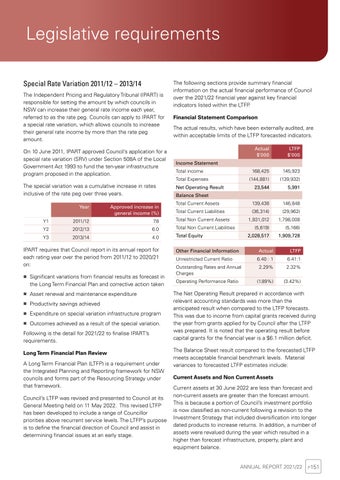Legislative requirements Special Rate Variation 2011/12 – 2013/14 The Independent Pricing and Regulatory Tribunal (IPART) is responsible for setting the amount by which councils in NSW can increase their general rate income each year, referred to as the rate peg. Councils can apply to IPART for a special rate variation, which allows councils to increase their general rate income by more than the rate peg amount. On 10 June 2011, IPART approved Council’s application for a special rate variation (SRV) under Section 508A of the Local Government Act 1993 to fund the ten-year infrastructure program proposed in the application. The special variation was a cumulative increase in rates inclusive of the rate peg over three years.
Y1
The following sections provide summary financial information on the actual financial performance of Council over the 2021/22 financial year against key financial indicators listed within the LTFP. Financial Statement Comparison The actual results, which have been externally audited, are within acceptable limits of the LTFP forecasted indicators. Actual $’000
LTFP $’000
168,425
145,923
(144,881)
(139,932)
23,544
5,991
Total Current Assets
139,438
146,848
Total Current Liabilities
(36,314)
(29,962)
1,931,012
1,798,008
(5,619)
(5,166)
2,028,517
1,909,728
Income Statement Total income Total Expenses Net Operating Result Balance Sheet
Year
Approved increase in general income (%)
2011/12
7.8
Total Non Current Assets
Y2
2012/13
6.0
Total Non Current Liabilities
Y3
2013/14
4.0
Total Equity
IPART requires that Council report in its annual report for each rating year over the period from 2011/12 to 2020/21 on: Significant variations from financial results as forecast in
the Long Term Financial Plan and corrective action taken Asset renewal and maintenance expenditure Productivity savings achieved Expenditure on special variation infrastructure program Outcomes achieved as a result of the special variation.
Following is the detail for 2021/22 to finalise IPART’s requirements. Long Term Financial Plan Review A Long Term Financial Plan (LTFP) is a requirement under the Integrated Planning and Reporting framework for NSW councils and forms part of the Resourcing Strategy under that framework. Council’s LTFP was revised and presented to Council at its General Meeting held on 11 May 2022. This revised LTFP has been developed to include a range of Councillor priorities above recurrent service levels. The LTFP’s purpose is to define the financial direction of Council and assist in determining financial issues at an early stage.
Other Financial Information
Actual
Unrestricted Current Ratio Outstanding Rates and Annual Charges Operating Performance Ratio
LTFP
6.40 : 1
6.41:1
2.29%
2.32%
(1.89%)
(3.42%)
The Net Operating Result prepared in accordance with relevant accounting standards was more than the anticipated result when compared to the LTFP forecasts. This was due to income from capital grants received during the year from grants applied for by Council after the LTFP was prepared. It is noted that the operating result before capital grants for the financial year is a $6.1 million deficit. The Balance Sheet result compared to the forecasted LTFP meets acceptable financial benchmark levels. Material variances to forecasted LTFP estimates include: Current Assets and Non Current Assets Current assets at 30 June 2022 are less than forecast and non-current assets are greater than the forecast amount. This is because a portion of Council’s investment portfolio is now classified as non-current following a revision to the Investment Strategy that included diversification into longer dated products to increase returns. In addition, a number of assets were revalued during the year which resulted in a higher than forecast infrastructure, property, plant and equipment balance. ANNUAL REPORT 2021/22
P151







